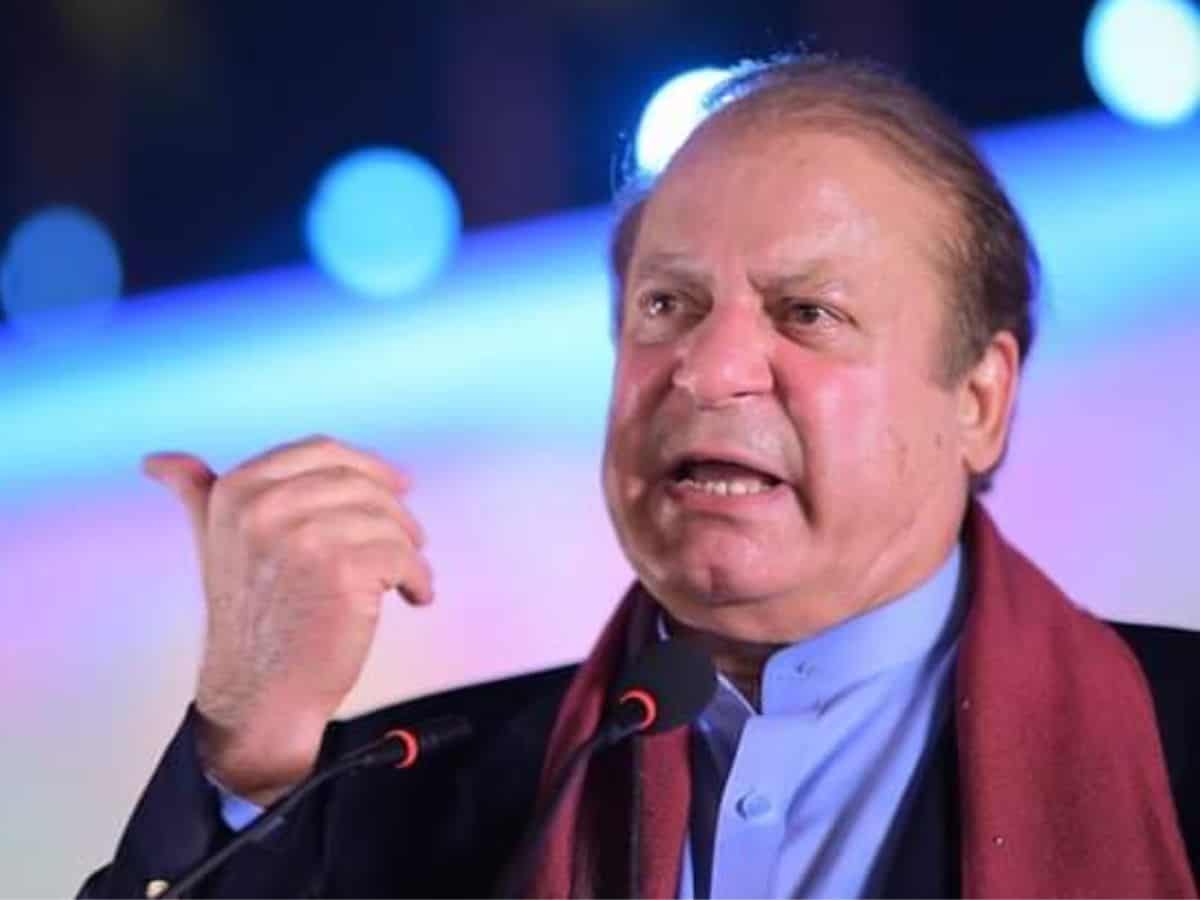
Lahore: India and Pakistan should “bury” the past and look at the future to live like good neighbours, former Pakistan Prime Minister Nawaz Sharif said on Thursday, in remarks seen as an attempt to reach out to New Delhi following Indian foreign minister S Jaishankar’s trip to Islamabad this week.
In an interaction with a group of Indian journalists, the three-time prime minister and president of the ruling Pakistan Muslim League (N) described Jaishankar’s visit as a “good opening” and said both sides should now engage and move forward.
Hailing Prime Minister Narendra Modi’s surprise trip to Lahore in December 2015, Sharif said he was not happy with the “long-pause” in the ties between the two countries and hoped that both sides should look ahead with a positive approach.
“We can’t change our neighbours, neither can Pakistan nor can India. We should live like good neighbours,” the 74 year-old leader said.
When asked whether a bridge builder between the two countries was required, he said “that is the role I am trying to play.”
Jaishankar travelled to Islamabad on Tuesday for a nearly 24 hour trip to attend a conclave of the Shanghai Cooperation Organisation (SCO), becoming the first Indian foreign minister to visit Pakistan in the last nine years that came amid continuing strain in ties.
“This is how things should go ahead. We would have liked PM Modi to come but it was good that the Indian foreign minister came. I have said before that we must pick up the threads of our conversation,” Sharif said.
“We have spent 70 years in this way (fighting) and we should not let this go on for the next 70 years. We (PML-N governments) have tried hard to work on this relationship to let it just go this way. Both sides should sit down and discuss how to go forward,” he said.
There was no bilateral meeting between the Indian and the Pakistani foreign ministers on the sidelines of the SCO conclave. For New Delhi, the trip was to attend the multilateral meeting.
However, some senior functionaries in the Pakistani establishment are projecting the Indian minister’s visit as an “ice-breaker”.
The influential Pakistani leader described Jaishankar’s trip to Islamabad as a good “opening”.
“We should not go to the past and should look at the future. It would be better if we bury the past so that we can use the potential between the two countries,” Sharif said.
“I think it (Jaishankar’s visit) is an opening and it must be taken forward,” he said.
Following a series of terror attacks on India by Pakistan-based terror groups in 2016, New Delhi decided not to hold any bilateral dialogue with Islamabad saying talks and terror can’t go hand-in-hand.
Sharif also fondly recalled Prime Minister Modi’s surprise stopover in Lahore on December 25, 2015 on his way back from Kabul.
“When PM Modi called me from Kabul and asked to wish me for my birthday, I said he was very welcome. He came and met my mother. These are not small gestures, they mean something to us, especially in our countries. We should not overlook them,” he said.
Sharif held former Pakistan prime minister Imran Khan for deterioration in relations between the two countries and especially referred to certain comments made by the cricketer-turned politician against Prime Minister Modi.
“Imran Khan used words that destroyed the relationship. As leaders of the two countries and neighbours, we should not even think, let alone utter such words.
“I am not happy about the pause in the relationship. I can speak for the people in Pakistan who feel for the Indian people and I would say the same for Indian people,” Sharif said.
In his remarks, the former Pakistan prime minister also pitched for resumption of cricketing ties between India and Pakistan and even said that he would like travel to India if the two teams play in the final of any major tournament in the neighbouring country.
“What do we gain by not sending teams to each other’s countries. They play all over the world, but it is not allowed in our two countries,” he said.
When asked if India should send a team for the Champion’s trophy to be held in Pakistan in February, he said, “You have spoken what is in my heart.”
Sharif also underlined the importance of having trade ties between the two sides.
“Maybe my thinking is different from others, but I believe we are a potential market for each other. Why should Indian and Pakistani farmers and manufacturers go outside to sell their products? Goods now go from Amritsar to Lahore via Dubai — what are we doing, who is benefitting from this? What should take two hours now takes two weeks,” he said.
Sharif also fondly remembered the visit to Lahore in 1999 of then Prime Minister Atal Bihari Vajpayee.
“He is still remembered for the Lahore Declaration and his words at the time. I watch the videos of that visit as it feels great remembering the pleasant memories,” Sharif said.
The Lahore Declaration was signed on February 21, 1999 following talks between then Indian Prime Minister Vajpayee and his Pakistani counterpart Sharif.
It was considered as a key milestone in India-Pakistan relations.
The ties between India and Pakistan came under severe strain after India’s warplanes pounded a Jaish-e-Mohammed terrorist training camp in Balakot in Pakistan in February 2019 in response to the Pulwama terror attack. The relations further deteriorated after India on August 5, 2019 announced the withdrawal of special powers of Jammu and Kashmir and the bifurcation of the state into two union territories.
